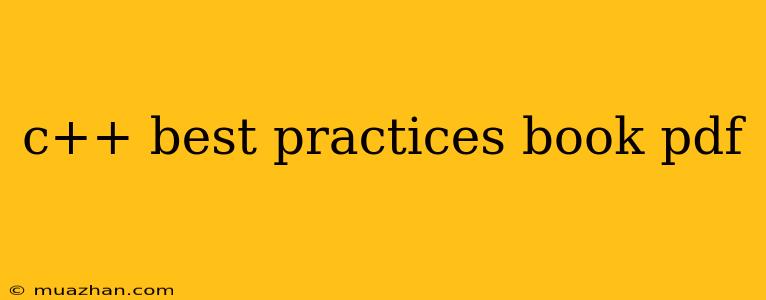C++ Best Practices: A Guide to Writing Clean, Efficient, and Maintainable Code
C++ is a powerful and versatile programming language, but its complexity can also make it challenging to write clean, efficient, and maintainable code. Following best practices is crucial for creating robust and reliable C++ applications. This article will explore some essential C++ best practices, covering topics such as code style, memory management, error handling, and design patterns.
Code Style
- Consistency is Key: Choose a consistent code style and stick to it throughout your project. This makes your code easier to read and understand. Common style guidelines include using consistent indentation, naming conventions, and whitespace.
- Descriptive Names: Use descriptive names for variables, functions, and classes. Names should clearly indicate the purpose of the element they represent. For example, instead of
x, usecurrent_positionfor a variable storing a position. - Code Comments: Write clear and concise comments to explain complex logic, non-obvious decisions, or potential pitfalls. Comments should be updated when code changes.
- Avoid Magic Numbers: Instead of using raw numbers directly in your code, define constants with meaningful names. This improves readability and makes it easier to modify values later.
Memory Management
- Use RAII (Resource Acquisition Is Initialization): RAII is a powerful technique in C++ that ensures resources are acquired and released automatically. Use RAII to manage resources like file handles, network connections, and dynamic memory allocation.
- Smart Pointers: Smart pointers like
std::unique_ptrandstd::shared_ptrhelp manage dynamically allocated memory automatically, reducing the risk of memory leaks. - Avoid Manual Memory Management: If possible, use the standard library's memory management tools instead of manually managing memory using
newanddelete. This reduces the likelihood of memory errors.
Error Handling
- Use Exceptions: Exceptions are a powerful mechanism for handling errors in C++. Throw exceptions when an error occurs and catch them to handle the situation appropriately.
- Clear Error Messages: Provide informative error messages to help developers understand and fix problems quickly.
- Error Handling Consistency: Maintain consistency in how you handle errors throughout your code. Choose an error handling strategy and stick to it.
Design Patterns
- Object-Oriented Design: Apply object-oriented programming principles like encapsulation, inheritance, and polymorphism to create well-structured and maintainable code.
- Design Patterns: Leverage established design patterns such as the Singleton, Factory, or Observer patterns to solve common programming problems in a standardized and efficient way.
Additional Best Practices
- Use the Standard Library: C++ offers a rich standard library with powerful components for data structures, algorithms, and I/O operations. Utilize these features to improve code efficiency and readability.
- Avoid Premature Optimization: Focus on writing clear and readable code first. Optimize only when necessary and have a clear understanding of the performance impact.
- Test Your Code: Write unit tests to ensure that your code functions as expected. Test-driven development can help you write better, more reliable code.
- Refactor Regularly: Refactoring involves improving the internal structure of your code without changing its external behavior. Refactor your code regularly to keep it clean, efficient, and maintainable.
Resources for Learning More
- Effective C++ by Scott Meyers: A classic guide covering essential C++ programming techniques.
- C++ Primer by Stanley Lippman, Josée Lajoie, and Barbara E. Moo: A comprehensive introduction to C++ programming.
- C++ Coding Standards: 101 Rules, Guidelines, and Best Practices by Herb Sutter and Andrei Alexandrescu: A detailed guide to C++ coding standards and best practices.
Following these best practices will help you write better, more reliable, and maintainable C++ code. Remember, the key is to focus on clarity, efficiency, and maintainability.
